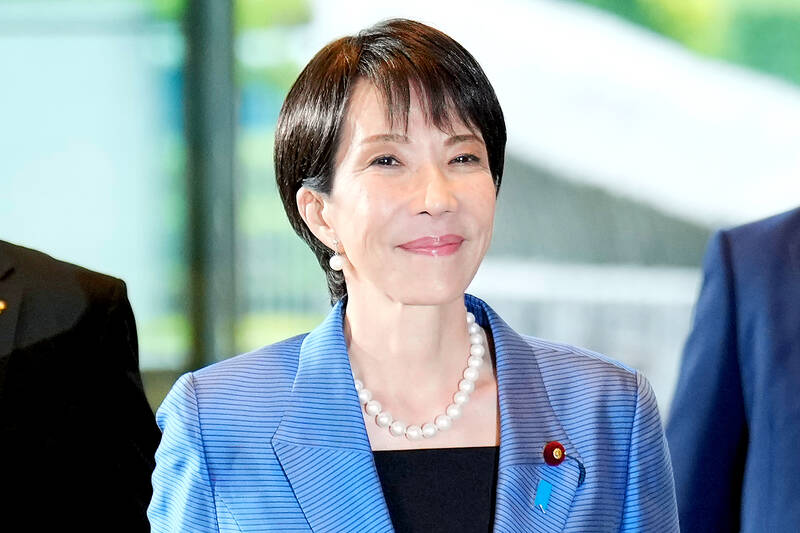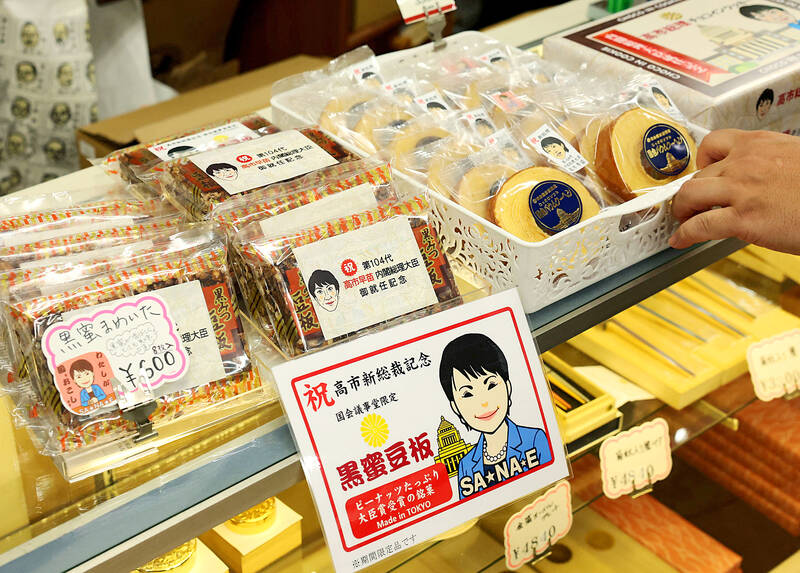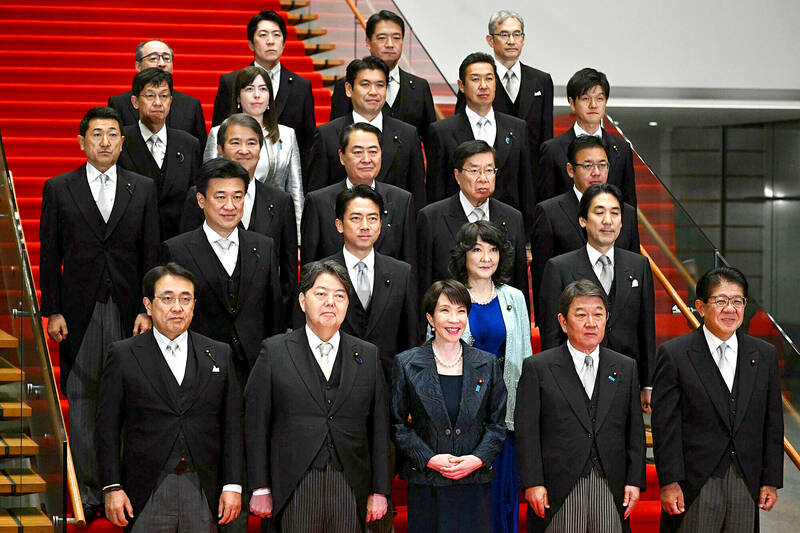After Sanae Takaichi took office as Japan’s first woman prime minister, some of her younger counterparts called it a symbolic victory.
The three local councilors anticipate Takaichi’s win will do little to shift the male-dominated world of politics or entrenched expectations that women will prioritize family over career.
‘GET MARRIED’

Photo: AP
After spending time away, Makoto Sasaki returned to her northern hometown Miyako, hoping to change local politics.
But as soon as she arrived, she was told by members of the public to focus on having a family.
“They said, ‘You won’t be able to get married if you work so hard,’” Sasaki said.

Photo: Reuters
They also said I “wouldn’t be a proper adult without giving birth,” she recalled. “It was shocking.”
In Japan, gender roles are rigid, with women usually expected to look after the home and family, even if they work.
As a result, women are grossly underrepresented at all political levels, as well as in business and media.

Photo: AFP
Last year, Sasaki ran for election, aged 27, and became one of 22 local councillors.
“Unless we start cutting into these larger societal structures — like the gender gap, the division of household chores by gender or care work — (the number of women politicians) won’t increase,” she said.
Takaichi, whose hero is Margaret Thatcher, had promised to appoint a cabinet with “Nordic” levels of women, but on Tuesday, she appointed just two, the same number as her predecessor, Shigeru Ishiba.
“My region, Iwate, has never had a female political leader, whether for governor or mayor,” Sasaki said, emphasizing the magnitude of the problem in Japan, which ranked 118 out of 148 this year in the World Economic Forum’s Global Gender Gap Report.
Men older than 70 make up about half of Sasaki’s council in Miyako, and there are just three women.
JUGGLING DOMESTIC LABOR
In the coastal city of Toba, Chihiro Igarashi “worries constantly” about juggling her work as a councillor with caring for her two children, aged two and three. “The belief that mothers are the ones who step in when children need them in an emergency remains deeply ingrained,” said Igarashi, 37, stressing that her husband and in-laws fully support her.
For couples with children under six in Japan, women spend an average of seven hours and 28 minutes on housework, caregiving, childcare and shopping, while men spend 1 hour and 54 minutes, according to 2021 government data, the latest available.
Igarashi said she initially did not want Takaichi to be elected as prime minister because of her conservative policies, including opposition to same-sex marriage and support for a 19th-century law requiring married couples to share the same surname.
Takaichi also wants Japan’s imperial family to stick to its male-only succession rules. But equally, “her toughness is appealing... she must have made extraordinary efforts to reach the level,” said Igarashi, one of two women councillors out of 13 in Toba. “In my region, it’s often civil servants, company executives or other locally well-known figures who become politicians,” she said. “And they’re all men.”
SINGLE MOTHER STIGMA
Erika Tsumori, a 34-year-old councilor in Atsugi city, near Tokyo, wants women to be given a chance to work without the constraints of societal expectations and stigma. As a mother of two raising her children alone, she was told during her campaign that she should try to hide her family dynamics.
“My city is conservative, so I was told (during the election) not to openly reveal that I was a single mother,” she said. “I was also told I was not a proper candidate as I wore dangly earrings,” she added, explaining that people saw them as too casual.
Tsumori believes Takaichi’s win is a “symbolic victory” but that the situation is changing, with the number of women candidates growing.
In 2024, just over 23 percent of candidates who ran in the election for the powerful lower house were women, compared with nearly 18 percent in 2017 and 13 percent in 2005, according to official data.
Eventually, said Tsumori, “there will surely be more women politicians.”

Taiwan has next to no political engagement in Myanmar, either with the ruling military junta nor the dozens of armed groups who’ve in the last five years taken over around two-thirds of the nation’s territory in a sprawling, patchwork civil war. But early last month, the leader of one relatively minor Burmese revolutionary faction, General Nerdah Bomya, who is also an alleged war criminal, made a low key visit to Taipei, where he met with a member of President William Lai’s (賴清德) staff, a retired Taiwanese military official and several academics. “I feel like Taiwan is a good example of

March 2 to March 8 Gunfire rang out along the shore of the frontline island of Lieyu (烈嶼) on a foggy afternoon on March 7, 1987. By the time it was over, about 20 unarmed Vietnamese refugees — men, women, elderly and children — were dead. They were hastily buried, followed by decades of silence. Months later, opposition politicians and journalists tried to uncover what had happened, but conflicting accounts only deepened the confusion. One version suggested that government troops had mistakenly killed their own operatives attempting to return home from Vietnam. The military maintained that the

Before the last section of the round-the-island railway was electrified, one old blue train still chugged back and forth between Pingtung County’s Fangliao (枋寮) and Taitung (台東) stations once a day. It was so slow, was so hot (it had no air conditioning) and covered such a short distance, that the low fare still failed to attract many riders. This relic of the past was finally retired when the South Link Line was fully electrified on Dec. 23, 2020. A wave of nostalgia surrounded the termination of the Ordinary Train service, as these train carriages had been in use for decades

Lori Sepich smoked for years and sometimes skipped taking her blood pressure medicine. But she never thought she’d have a heart attack. The possibility “just wasn’t registering with me,” said the 64-year-old from Memphis, Tennessee, who suffered two of them 13 years apart. She’s far from alone. More than 60 million women in the US live with cardiovascular disease, which includes heart disease as well as stroke, heart failure and atrial fibrillation. And despite the myth that heart attacks mostly strike men, women are vulnerable too. Overall in the US, 1 in 5 women dies of cardiovascular disease each year, 37,000 of them